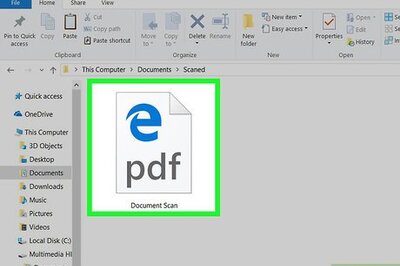
views
New Delhi: The moment we think about cutting costs, we start thinking of our various expenditures we incur and start working out as to which one to cut or reduce.
The real operation of cutting of costs should start with two different basics - understanding the various future goals, to know exactly how much we have to save necessarily and ensure a proper cash flow analysis of all our income and expenditure.
Analysis of future goals is essential so that we can workout a judicious balance of current needs/expenses vis-à-vis the future needs.
Analysis of cash flow will not only throw a clear picture of our expenditure pattern, it will also provide a clear idea of whether all the presumed income had been earned or is there any difference in our expected income to the actual income.
The basics for cutting costs:
We need to work out a comprehensive account of all the expenses we incur and understand the nature of each and every expenditure. Generally, all the expenses one incurs can be classified into:
The third kind of expenses should be totally prevented and the second one to be rated on the basis of both, the need and for the value of money. For basic needs, we do not have any choice but for any thing else, think before you do. Use your head rather than heart.
The actual actions, which will save costs:
1) Prevent all impulsive purchasesThe biggest wasteful purchase pattern is caused by the impulsive purchases, which are not projected and expected. It is also true that a majority of impulsive purchases at a later stage are regretted. In fact, the best advice here is try to prevent any visits to malls or places like that which thrive on making you and me buy what they show rather than what we want.
2) Replace credit card with debit card Credit Card is a wild instrument, which induces one to buy/spend more than what he or she can afford or need. Replacing it with a debit card, which serves the same purpose with only as much money you have to spend as the best option.
3) Car expenses While buying a car, do not buy a car for prestigious reasons but buy only for utility purposes. Remember most of the individuals currently buy a car on a finance scheme. Thus, buying a bigger car leads to continuous outflow of higher EMI (equated monthly installment), which consists of huge additional interest outflow, not to forget the regular higher outflow towards fuel and maintenance costs
4) Car expenses II When you buy a car on a loan, be careful about the accessories. Not only we tend to buy unnecessary/expensive accessories because there are no immediate cash outflows from our hand, we tend to forget the interest outflow on the additional loan.
5) Car expenses IIIA very good measure to reduce car expenses is to use either company provided vehicles for office going or creating a car pool with either colleagues or neighbours.
6) Never visit a saleNever visit a sale unless and until you are sure of both – you need those goods and the sale is a genuine one.
7) Housing loan payoutsWhen you evaluate the cash flows of most of the people in the age group of 30 - 40, majority of the outflow is accounted for housing loan repayment and car loan repayment. Buying a house for living is always necessary but buying one which is bigger than need entails two important outflows – payment of larger EMIs again loosing in the interest outflow and further a regular high cost incurrence towards maintenance and taxes.
8) Juggle with various loan optionsBe very clear, between home loan and car loan, home loan is cheaper and provides also additional tax benefits. Between credit card loans and personal loans, personal loans are cheap, most of the times. Hence, if you have to compulsorily take a loan, end up taking the one, which is cheaper to you.
9) Mobile phone usageLook at the total cost of your communication and you can evaluate yourself the wastages incurred due to that. Also, now so many good plans available, try to choose a plan where the cost implications are low.
10) Prevent expensive gadgetsThe best way is to look at utility rather than the show. (Of course, I know I am in the minority in this claim and people generally get carried away so much in these gadgets, they do not even realize what they are doing)
I tried to think differently instead of the usual ones, which is of macro nature for cost cutting. I would like to end with two of the statements passed on to us for generations – look and buy what you need rather than what you want and other, moving into the next ladder of standard of living is very easy but maintaining that standard is very difficult. If you adopt this in your life, you will never have any regrets.
The author, B Srinivasan, is a Certified Financial Planner.



















Comments
0 comment